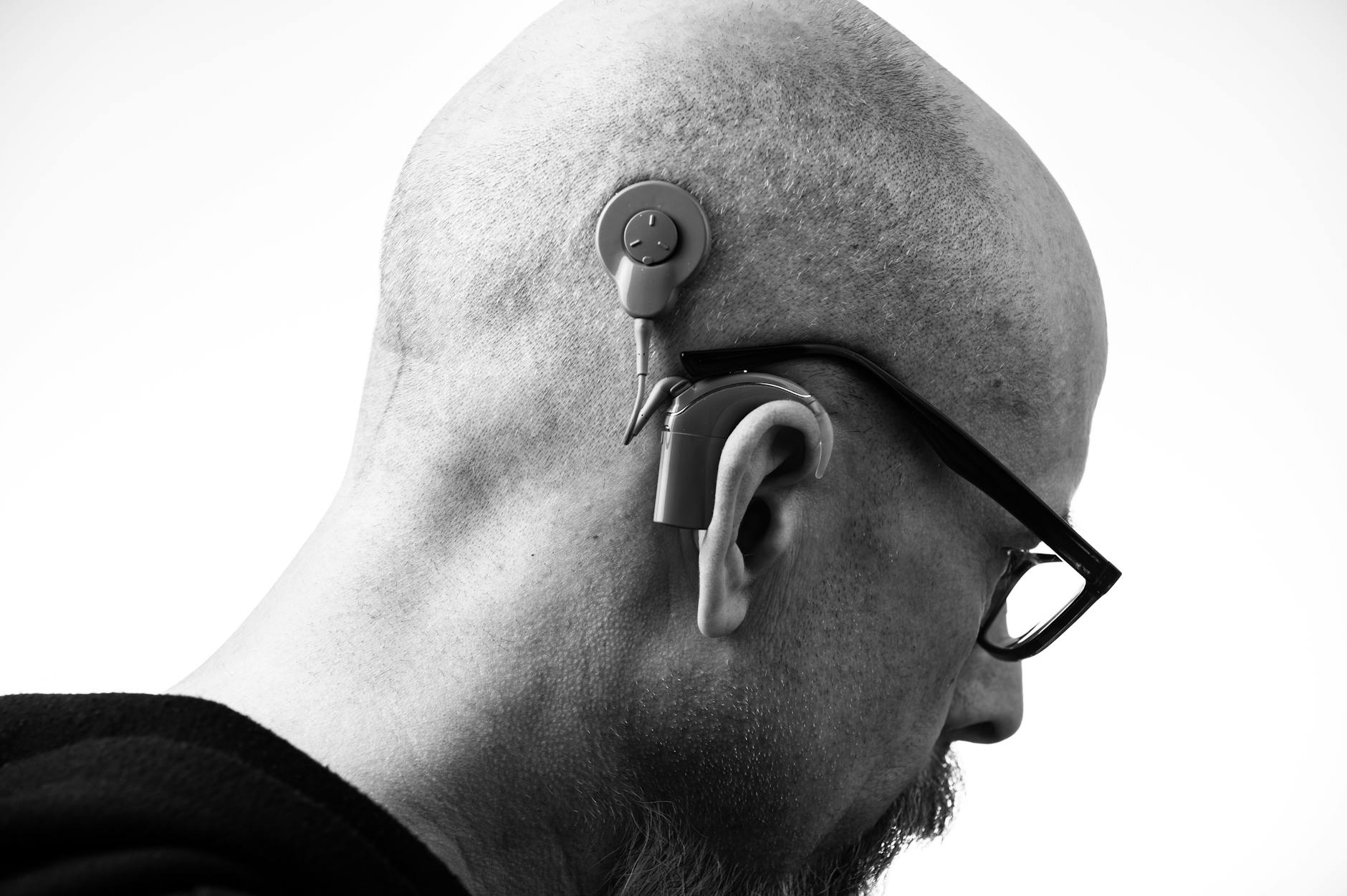Lede: You know sleep apnea can strain your heart and make mornings rough. But here’s a quieter surprise: it can also chip away at your hearing and ramp up tinnitus. The good news? Treating sleep apnea doesn’t just help you (and your bed partner) sleep—it can protect those delicate inner-ear cells that make speech sparkle and music sing.
Wait—sleep apnea affects ears?
Yes. Obstructive sleep apnea (OSA) repeatedly narrows or blocks your airway during sleep, leading to brief oxygen dips, blood pressure spikes, and fragmented rest. Those nightly rollercoasters don’t stop at your chest—they ripple through your inner ear and auditory brain pathways. Several large population studies have linked sleep apnea with a higher chance of hearing problems, especially at high frequencies where age and noise often hit first.
Even if your daytime hearing test looks “okay,” you might notice clues: harder-than-expected conversations in noise, morning tinnitus spikes, or a feeling that your ears need a few hours to “wake up.” That’s not a diagnosis—just common patterns worth noticing and discussing with an audiologist or sleep specialist.
Why ears are vulnerable during apnea
1) Oxygen dips stress the cochlea
Your inner ear (cochlea) is a tiny, high-metabolism organ with zero patience for oxygen fluctuations. During apnea events, oxygen levels fall and then rebound. That intermittent hypoxia can:
- Starve hair cells (the sound-to-electricity converters)
- Trigger oxidative stress (free radicals that damage cell membranes and DNA)
- Inflame the delicate stria vascularis (your ear’s energy factory)
2) Blood pressure surges shake micro-circulation
Each apnea can drive abrupt changes in blood pressure and sympathetic nervous system activity. Over time, this stresses the microscopic vessels that feed the inner ear. Think of it like tiny earthquakes on a fragile bridge: the structure might hold for a while, but small cracks add up.
3) Inflammation travels
OSA is a systemic inflammatory condition. Inflammation doesn’t respect boundaries—it can reach the ear and the auditory brainstem, impairing how we encode and process complex sounds like speech in a busy restaurant.
4) Sleep fragmentation hits your auditory brain
Sleep builds learning and attention. Choppy sleep dulls your brain’s ability to follow fast-changing sounds, segregate voices, and ignore irrelevant noise. So even if the ear hardware is intact, software (auditory processing) can lag—especially when you’re tired.
What the research says (plain English version)
- People with sleep apnea show higher odds of hearing impairment in large, community-based studies—even after accounting for age and common risk factors. High frequencies (where consonants live) seem particularly affected.
- Tinnitus appears more common in people with OSA. Some small studies suggest treatment (like CPAP) may reduce tinnitus severity in a subset of patients, likely by improving oxygenation and stabilizing sleep.
- Cardiometabolic companions—hypertension, diabetes, and obesity—amplify ear risk. Manage the bundle and you help your hearing.
Science note: We’re still learning if treating OSA can reverse hearing loss once it’s established. The safer bet is prevention and stabilization—catching problems early and improving the environment your ears live in overnight.
But isn’t snoring just “annoying noise”?
Snoring can reach 50–80 dB at the source—annoying, yes. While that’s below levels typically associated with immediate damage, exposure piles up across years, and bed partners are often closer to the “speaker.” If you share a room with a loud snorer, consistent exposure can nudge your overall daily noise dose upward. Addressing apnea treats more than the noise; it treats the cause.
Good news: CPAP devices are engineered to run quietly (often around 25–30 dB). If your machine sounds loud, check for mask leaks, fit, and filters—simple fixes often turn down the “hiss.”
Your 360° plan: protect your hearing while you sleep
1) Screen for apnea if you notice the signs
- Loud snoring, gasping, or witnessed pauses in breathing
- Morning headaches, dry mouth, or unrefreshed sleep
- Daytime sleepiness or “brain fog”
- Morning tinnitus spikes or ear fullness
Next step: talk with your primary care clinician or an ENT/sleep specialist about a sleep evaluation. Home sleep apnea tests are increasingly common and straightforward.
2) Treat the sleep apnea (and stick with it)
- CPAP/APAP: Gold-standard therapy. It keeps your airway open and oxygen steady, which is good for your heart and your ears. If comfort is tough at first, work with your provider—adjusting mask style, pressure settings, humidity, and ramp features can make all the difference.
- Oral appliance therapy: For mild-to-moderate OSA or CPAP intolerance, dentist-fitted devices hold the jaw forward. Ask your sleep specialist if you’re a candidate.
- Positional therapy: Avoiding back-sleeping can reduce apnea for some. Simple devices or smart wearables can help.
- Weight management: Even modest loss can improve OSA severity and, indirectly, ear health by taming inflammation and blood pressure.
- Upper airway therapies/procedures: Considered case by case with ENT and sleep teams.
Tip: Give any therapy a fair trial. Comfort improves dramatically after mask and fit tweaks—don’t give up early.
3) Get a baseline hearing check (then monitor)
Ask an audiologist for:
- Pure-tone audiogram: Your basic hearing map.
- High-frequency testing (when available): Can catch subtle changes earlier.
- Speech-in-noise testing: Vital for real-world listening.
- Otoacoustic emissions: A window into hair cell health, sometimes revealing stress before it hits your audiogram.
Keep copies. Repeat on a schedule your audiologist recommends, or sooner if you notice changes—especially after starting or adjusting sleep apnea therapy.
4) Lower the rest of your ear risk
- Tame blood pressure, blood sugar, and lipids: Your ears love good circulation.
- Protect from noise: Carry earplugs for concerts, power tools, or stadiums. Noise plus OSA is a double hit.
- Review meds: Don’t stop anything on your own, but ask your clinician about ototoxic risks if your hearing or tinnitus changes.
- Move daily: Exercise improves vascular health, sleep quality, and mood—an ear-friendly trio.
Will treating sleep apnea help my tinnitus?
It might. While not guaranteed, some people report quieter mornings and fewer spikes once their oxygen and sleep stabilize. Think of tinnitus like a smoke alarm—the less “smoke” (stress, poor sleep, inflammation), the less often it screams. Managing OSA can reduce that background smoke.
Myth busters
- Myth: “I only snore when I’m exhausted—it’s not a big deal.”
Reality: Intermittent OSA still matters. If bed partners notice pauses or gasps, get checked. - Myth: “CPAP is too loud; it’ll hurt my hearing.”
Reality: Modern units are very quiet. If yours is noisy, it’s usually a leak or maintenance issue—both fixable. - Myth: “My hearing test was normal, so my ears are fine.”
Reality: You can struggle in noise with a normal audiogram. Ask about speech-in-noise testing and ways to boost listening performance.
30-day Ear-and-Sleep Reset
Give your ears and sleep a month of attention and see what changes:
- Week 1: Book an audiology baseline and a sleep evaluation if you have symptoms. Start a simple “ear and sleep” journal—rate sleep quality, note tinnitus, and jot where hearing felt hard.
- Week 2: Audit your noise diet (work, commute, hobbies). Add hearing protection where needed. Aim for a consistent sleep window and reduce late caffeine/alcohol.
- Week 3: If you’ve started CPAP or an oral appliance, troubleshoot comfort early with your provider. Track morning tinnitus and daytime listening ease.
- Week 4: Review wins and gaps with your care team. Set a 3–6 month follow-up for hearing and sleep. Celebrate small improvements—consistency compounds.
When to call in the pros
- Audiologist: You notice new or worsening hearing difficulty, especially in noise; persistent tinnitus; or hearing feels worse after poor sleep.
- Sleep specialist or ENT: Loud snoring, witnessed apneas, gasping, or severe daytime sleepiness. Also call promptly if you develop sudden hearing loss—treat that as a medical emergency.
You don’t have to untangle this alone. Hearing and sleep are team sports. An audiologist, sleep specialist, and your primary care clinician can build a plan that fits your life.
Big picture: your ears want smooth nights
Healthy hearing thrives on stable oxygen, calm blood pressure, low inflammation, and good sleep architecture. Sleep apnea unsettles all four. The fix isn’t flashy, but it’s powerful: diagnose, treat, and protect. Your reward is bigger than quiet nights—it’s clearer conversations, calmer tinnitus, and more energy to enjoy the sounds you love.
Further Reading
- Diabetes and Your Hearing: What High Blood Sugar Does to Your Ears (and How to Protect Them) (Hearing Loss) - When Hormones Shift, Ears Listen: Menopause and Your Hearing (Hearing Loss) - Menopause and Your Ears: How Hormone Shifts Change Hearing (and What Helps) (Hearing Loss) - Menopause Can Shift Your Hearing: What to Watch, What to Do (Hearing Loss)Frequently Asked Questions
Can snoring itself damage hearing?
Occasional snoring isn’t likely to cause direct damage, but chronic loud snoring can add to your cumulative noise exposure over years—especially for bed partners. The bigger issue is what snoring often signals: sleep apnea, which creates oxygen dips and blood pressure swings that stress the inner ear. If snoring is frequent or loud, consider a sleep evaluation.
Will CPAP noise harm my hearing?
Modern CPAP machines are designed to be very quiet (often around 25–30 dB). If yours sounds loud, it’s usually due to a mask leak, loose tubing, or a dirty filter—problems your sleep provider can help fix. CPAP therapy can stabilize oxygen levels and may help protect hearing and reduce tinnitus for some people.
If I treat sleep apnea, will my hearing improve?
Some people notice better morning clarity and fewer tinnitus spikes once apnea is treated, but hearing recovery isn’t guaranteed, especially if damage has already occurred. The most consistent benefit is preventing further stress to the ear and brain. Pair OSA treatment with regular hearing checks and smart noise protection.
My hearing test is normal but I still struggle in noise. What now?
Ask your audiologist for speech-in-noise testing and a discussion of listening strategies. Auditory training, remote microphone accessories, room acoustics, and managing sleep quality can all help, even when the basic audiogram is normal.
References
- Mayo Clinic – Obstructive sleep apnea overview
- NIH/NIDCD – Noise-Induced Hearing Loss
- American Academy of Sleep Medicine – Patient education on OSA
- NIH PubMed – Association of sleep apnea with hearing impairment (population data)
- NIH PubMed – Obstructive sleep apnea and tinnitus association
- NIH/NIDCD – Tinnitus


